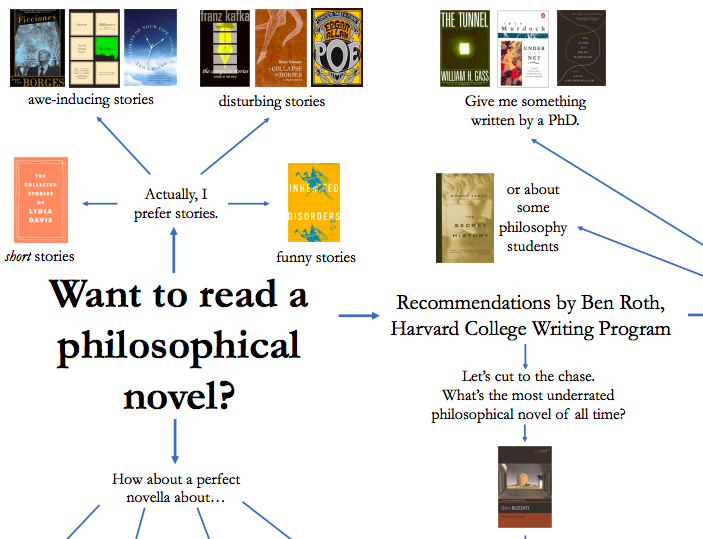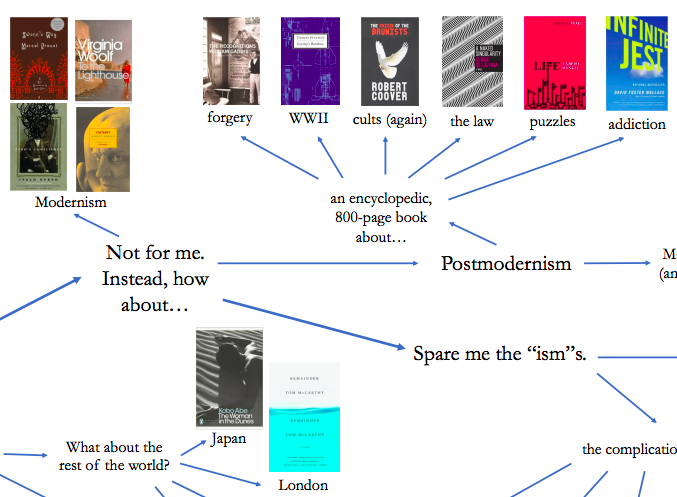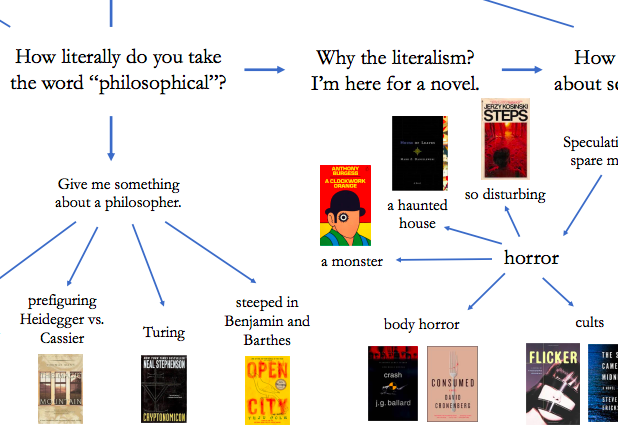
Do you want to read a philosophical novel? Sure, we all do. But the question of exactly what kind of philosophical novel you want to read, let alone which individual book, isn’t quite so easily answered. But now a professional has come to the rescue: “Ben Roth, a philosopher who teaches in the Harvard College Writing Program, has put together a kind of flowchart recommending philosophical novels and stories,” reports Daily Nous’ Justin Weinberg. “With categories like ‘about a philosopher,’ ‘by a Ph.D.,’ ‘horror,’ ‘the complications of history,’ and many more, the chart is pretty big.”
The choices you make in navigating it could land you on the work of a writer from one of a variety of countries, one of several eras, and one of a capacious range of definitions of “philosophical.” If you take the word in the sense of a novel’s being about or steeped in the work of a particular philosopher, Roth recommends books like Thomas Bernhard’s Correction (Wittgenstein) and Teju Cole’s Open City (Benjamin and Barthes). Elsewhere on the map he also includes novels written by philosophically credentialed academics like William Gass, Iris Murdoch, and Anuk Arudpragasam.

If you prefer novels where “fiction writers drop into straight essayistic mode,” Roth offers a choice between the easy mode of Milan Kundera’s The Unbearable Lightness of Being and the hard mode of Robert Musil’s The Man Without Qualities. (If you just wanted to read about a bunch of philosophy students, well, there’s always Donna Tartt’s The Secret History.)
To those who go in for more “novelly novels,” as Geoff Dyer (a known Bernhard enthusiast and author of some pretty philosophical fiction himself) memorably put it, Roth presents more forks in the road: Would you like to read science fiction? Existentialism? Postmodernism? A book free of ‑isms entirely, or anyway as free as possible?

Your answers to those questions and others could have you reading anything from J.G. Ballard’s Crash (“body horror”) to Jean-Paul Sartre’s Nausea (“mid-century French classic”) to David Foster Wallace’s Infinite Jest (postmodern, encyclopedic, on addiction). Other choices may lead you to selections less obviously involved with philosophy: J.M. Coetzee’s Waiting for the Barbarians, or Virginia Woolf’s To the Lighthouse, Haruki Murakami’s Hard-Boiled Wonderland and the End of the World. Of course, you may not want to read a philosophical novel at all: you may want to read philosophical short stories, in which case Roth recommends such form-defining figures as Edgar Allan Poe, writer of “disturbing stories”; Lydia Davis, writer of “short stories” (emphasis his); and Jorge Luis Borges, writer of “awe-inducing stories.”

Borges and quite a few other names on Roth’s philosophical-novel flowchart also appear in critic David Auerbach’s “Inquest on Left-Brained Literature,” a revealing look at the authors read by “engineers with a literary bent.” Both also include Don DeLillo, whose work Auerbach characterizes as making “heavy use of phantasmagoria, complemented by very sophisticated narrative construction,” and “simple, visceral, classical themes approached in [a] flashy, novel way.” Roth, for his part, describes DeLillo’s White Noise as his “favorite book ever.” Elsewhere on the flowchart, to the philosophical literature enthusiast who’s read everything he offers “the most underrated philosophical novel of all time,” Dino Buzzati’s The Tartar Steppe. No, I haven’t heard of it either, but I have to admit that it keeps good company.
Related Content:
Jorge Luis Borges Selects 74 Books for Your Personal Library
R. Crumb Illustrates Jean-Paul Sartre’s Nausea: Existentialism Meets Underground Comics
44 Essential Movies for the Student of Philosophy
Based in Seoul, Colin Marshall writes and broadcasts on cities, language, and culture. His projects include the book The Stateless City: a Walk through 21st-Century Los Angeles and the video series The City in Cinema. Follow him on Twitter at @colinmarshall or on Facebook.


The Tartar Steppe is one of my favorite books of all time, I’ve read it twice and will read again. I read it because it was on Borges’ list. It is a beautiful, strange novel that exists perfectly on two levels, simultaneously a biting satire of militarism as well as an absurdist depiction of life itself.
man man man man man man man Virginia Woolf man man bonus points this one is also a rapist man man man man man man
I would have liked this a lot better if I could actually read the titles of the books.
I agree with Susan. Could someone just write out the titles in a list rather than subjecting us to this illegible flowchart?
There is a link within the article (Roth’s philosophical-novelflowchart) which opens a version where all titles are readable.
hi, I am a blind person, and this postcard is a visual list which I can’t read with my screen reader. Can anyone create a readable list either in html or text? thanks
Neither the original nor this fragmentary cut version have legible titles. Good thing that I recognize some of them and they are mostly apt for the trash bin, so nothing valuable was missed.
Kaveintrhan, here is a list. I have not written out the flow chart headings, though. I don’t think I missed any.
From left to right (at least in some sense):
Ficciones, Borges
We Others, Steven Millhauser
Stories of your Life and Others, Ted Chiang
Complete Stories, Kafka
A Collapse of Horses, Brian Evenson
Complete Tales and Poems, Poe
The Collected Stories, Lydia Davis
Inherited Disorders, Adam Sachs
At the Mountains of Madness, Lovecraft
Bartleby, Melville
Train Dreams, Denis Johnson
The Invention of Morel, Adolfo Casares
The Tunnel, William H. Gass
Under the Net, Iris Murdoch
The Story of a Brief Marriage, Anuk Arudpragasam
The Secret History, Donna Tartt
The Tartar Steppe, Dino Buzzati
The Opposing Shore, Julien Gracq
Icefields, Thomas Wharton
The Man Without Qualities, Robert Musil
The Unbearable Lightness of Being, Milan Kundera
Correction, Thomas Bernhard
The Magic Mountain, Thomas Mann
Cryptonomicon, Neal Stephenson
Galatea 2.2, Richard Powers
The Discovery of Slowness, Sten Nadolny
Intuition, Allegra Goodman
A Clockwork Orange, Anthony Burgess
House of Leaves, Mark Danielewski
Steps, Jerzy Kosinski
Crash, J.G. Ballard
Consumed, David Cronenberg
Flicker, Theodore Roszak
The Sea Came in at Midnight, Steve Erickson
Ice, Anna Kavan
Hard Boiled Wonderland and the End of the World, Haruki Murakami
Dhalgren, Samuel R. Delany
Annihilation, Jeff Vandermeer
The City, The City, China Melville
Time’s Arrow, Martin Amis
Notable American Women, Ben Marcus
The Man in the High Castle, Philip K. Dick
The Children of Men, PD James
The Intuitionist, Colson Whitehead
Never Let me Go, Kazuo Ishiguro
The Red Men, Matthew De Abaitua
A Canticle for Leibowitz, Walter Miller Jr.
The Brothers Karamazov, Dostoevsky
The Death of Ivan Ilyich, Tolstoy
The Notebook of Malte Laurids Brigge, Rilke
The Immoralist, Gide
The Brief History of the Dead, Kevin Brockmeier
The Wall, Marlen Haushofer
Nausea, Sartre
The Mandarins, Simone de Beauvoir
The Plague, Camus
The Moviegoer, Walker Percy
Stoner, John Williams
The Outsider, Richard Wright
My Heart Hemmed In, Marie Ndiaye
You Deserve Nothing, Alexander Maksik
Swann’s Way, Proust
To The Lighthouse, Woolf
Zeno’s Conscience, Svevo
Contempt, Alberto Moravia
The Woman in the Dunes, Kobo Abe
Remainder, Tom Mccarthy
The Meursault Investigation, Kamel Daoud
2666, Roberto Bolano
The Recognitions, Gaddis
Gravity’s Rainbow, Pynchon
The Origin of the Brunists, Robert Coover
A Naked Singularity, Sergio de la Pava
Life, a User’s Manual, Georges Perec
Infinite Jest, David Foster Wallace
White Noise, Don DeLillo
In the Name of the Rose, Umberto Eco
Explorers of the New Century, Magnus Mills
Waiting for the Barbarians, J.M. Coetzee
The Satanic Verses, Salman Rushdie
Song of Solomon, Toni Morrison
Housekeeping, Marilynne Robinson
Pattern Recognition, William Gibson
Eat the Document, Dana Spiotta
The Flame Throwers, Rachel Kushner
The Uses of Enchantment, Heidi Julavits
The Map and the Territory, Michel Houellebecq
I Hate the Internet, Jarett Kobek
The Sense of an Ending, Julian Barnes
The Sellout, Paul Beatty
Fates and Furies, Lauren Groff
Mating, Norman Rush
Thank you, Ed!
@try harder
I agree, there’s not even one helicopter-gendered neurodivergent POC otherkin on this list. I just can’t believe this. It’s the current year. I. Just. Can’t.
Humility cast aside. “The Woman Who Hated Philosophers” Swallow Tail Press 2017.
I very much recommend Julia Kristeva’s work. She is said to be the greatest living female philosopher and possibly the greatest living philosopher.
thank you so much